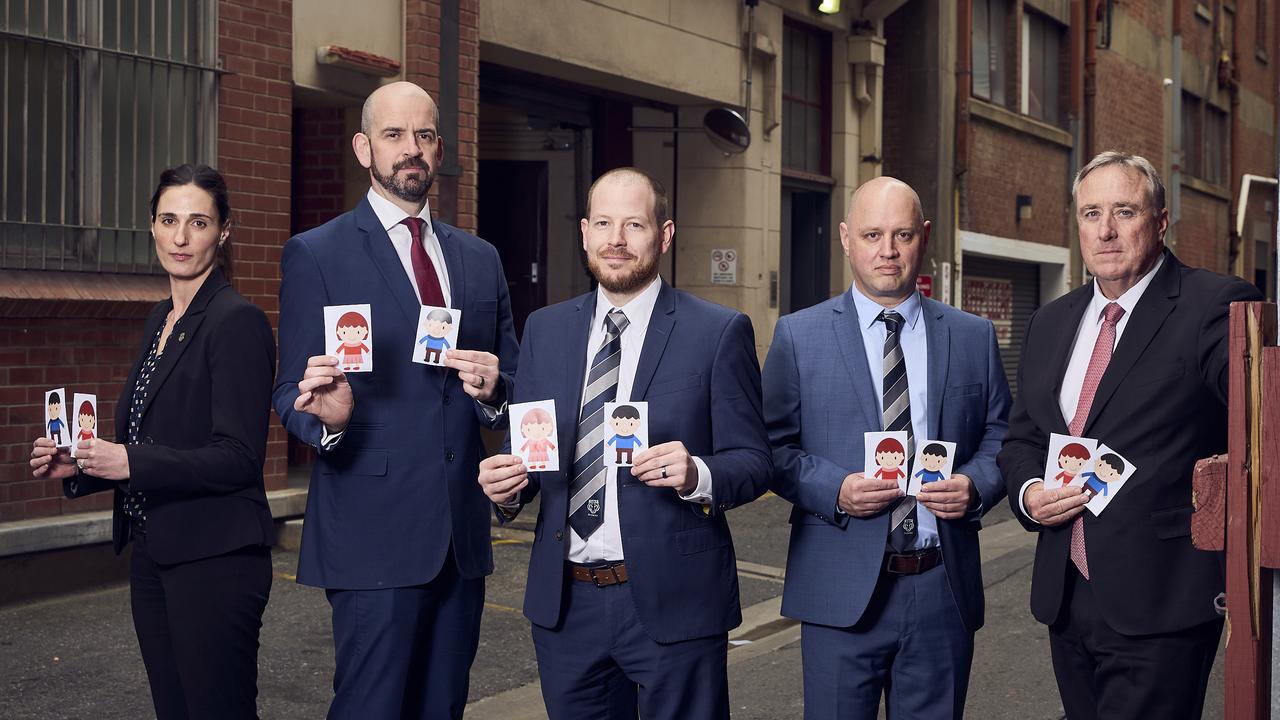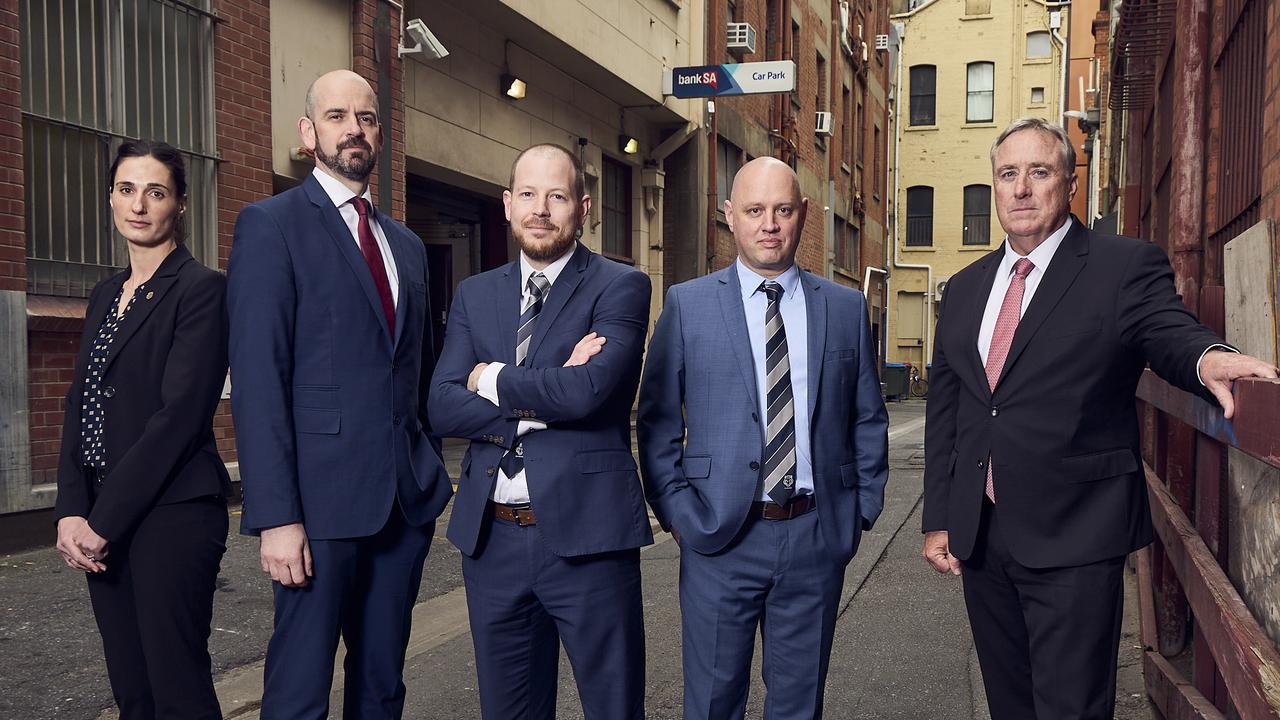SA’s elite JACET police team calls for community unity in the face of growing number of sextortion cases targeting children and teens
An elite team of police has revealed the latest hi-tech abuse crime predators are inflicting on faultless and vulnerable children.

Sextortion is one of SA’s fastest-growing crimes, an elite child-rescuing police team says – but victims need to know it is not their fault and they are not to blame for a predator’s actions.
Detectives from the Joint Anti-Child Exploitation Team said children as young as 10 are being tricked into providing explicit material to pedophiles posing as people their own age.
Those offenders, they said, then use that material to blackmail victims into providing more content – which they exchange online to increase their standing in the pedophile world.
JACET Detective Senior Constable Jordan Dowling said children wrongly believed apps like Snapchat were safe to use because photos delete themselves upon viewing.
“We are seeing a lot of offenders use screen-recording software so, despite the image disappearing, they have a record of that – they’ve still got a copy,” he said.
“They exist forever, these images of vulnerable kids, and that’s not a coincidence … vulnerable kids are deliberately selected for this by offenders.
“Offenders put an incredible amount of time into creating false personas online, and into developing and building that relationship with the victim under false pretences.
“The victim is in the genuine belief they’re in a relationship – so it’s not just that material is being distributed, there’s also that betrayal of a young person’s trust.
“The psychological harm caused, all without the offender making physical contact with the child, is extraordinary.
“With the advancement of technology, every kid has a phone – and that’s what makes sextortion so scary.”
SEE WITH MY EYES
To mark National Child Protection Week 2023, The Advertiser is stepping inside JACET to see how victims are saved and pedophiles are busted.
In the past two years, the combined AFP/SA Police unit that removes children from harm by predators has seen a surge in the number of reported sextortion cases.
Their efforts in bringing offenders to justice have caught the attention of judges, leading to a growing acceptance that the crime is just as damaging to children as “contact offending”.
In September 2022, sextortionist pedophile Cameron Robert Bowen made Australian legal history by pleading guilty to maintaining an unlawful sexual relationship with a child.
He was the first person ever to confess to having abused a child without meeting them in person, and solely by adopting false identities online to blackmail them.
Bowen – who targeted LGBTQI+ teenagers on Instagram and Facebook – is now serving a 15-year prison term for his crimes.
Detective Leading Senior Constable Stephen Hegarty said screen captures had become a lucrative part of the global online exploitation trade.
“There are now even dedicated child sex offender forums for just that kind of material … it’s a genre that did not exist 10 years ago,” he said.
“It’s become something they actively want, it’s a grouping of interest for offenders who trade in the footage.”
Hegarty, who identifies victims by scouring millions of chat logs, images and videos every year, said the impact of sextortion was “harrowing”.
“I wish people could see with my eyes sometimes, and what I had seen,” he said.
“I see young people who are really troubled, in desperate need of help, discussing self-harm and depression with the people who are, unknown to them, abusing them.
“When we approach the children after an arrest, how do we support them through this betrayal when they are already extremely vulnerable?
“Because that is the issue – it’s often the most vulnerable children that need our help the most that end up being the victims of these perpetrators.
“The ones who need protecting the most are the ones who become the victims the most.”

TALK ABOUT IT
Dowling and Hegarty said they understand the community found child abuse “too confronting” to discuss, and agreed it was an abhorrent topic to consider.
However, they said the public had to turn their minds to the realities of the problem in order to help JACET and law enforcement agencies around the world stem the tide.
“It’s not just a law enforcement problem, we can’t arrest our way out of this problem,” Dowling said.
“We need other organisations to do their part and educate to prevent this from happening in the first place … this needs to happen through schools and education.”
Hegarty said communities and families “should be talking about” the potential for online abuse, not allowing it to “get swept under the rug”.
“When I was a kid, you were told certain safety things – stranger danger, crossing the street – because, as a parent or caregiver, you educate your child,” he said.
“This is exactly the same thing, it’s just that there’s another danger now and you can’t stick your head in the sand.
“It might be something that’s new to you but it’s so important to have that conversation, as early as you can.”
He said parents and caregivers also had to shift their mindsets and show empathy to children who had been tricked into sending photos, because it was not their fault.
“Sometimes you hear people say ‘why didn’t the child say something?’ and that’s really unhelpful thinking,” he said.
“There is always a reason they didn’t say something – it could be guilt, it could be shame, it could be fear.
“It’s really difficult for them, they are going through horrendous things, and you can’t have any preconceived notions.
“Adults don’t need to know the latest technology, they just need to say to kids ‘you haven’t done anything wrong, you’re not in trouble, you’re the victim’.
As long as there’s that as a basic core principle then, even as apps and trends change, that openness helps gives victims what they need.”
YOU’RE NOT ALONE
Dowling urged children to reach out to other trusted family members like “a cool aunty or uncle, or a family friend” if they were concerned about telling their parents.
Hegarty said that the most important thing was for victims to tell someone they had been targeted.
“It’s not your fault and it’s so important you don’t blame yourself – these offenders are groomers, 100 per cent,” he said.
“Please reach out, there’s people there who really want to help you and that’s a fact.
“But first you’ve got to look after yourself, and there’s people who can help you with that as well.
“What we do with catching the bad guy comes second – the most important thing is you get the help and support that you need.
“Know that you have done nothing wrong and there’s people here to help and to listen to you.”

IF YOU OR SOMEONE YOU KNOW NEEDS HELP
If you or someone you know is impacted by child sexual abuse or exploitation, including historical child sexual abuse, or online child sexual exploitation there are support services available.
These avenues of support are available to help, listen and believe.
If you think a child is in immediate danger call triple-0 (000), Crimestoppers on
1800 333 000, or your local police.
For more information, visit:
The Australian Centre to Counter Child Exploitation – https://www.accce.gov.au/help-and-support/who-can-help
Think You Know – https://www.thinkuknow.org.au/
The Carly Ryan Foundation – https://www.carlyryanfoundation.com/





